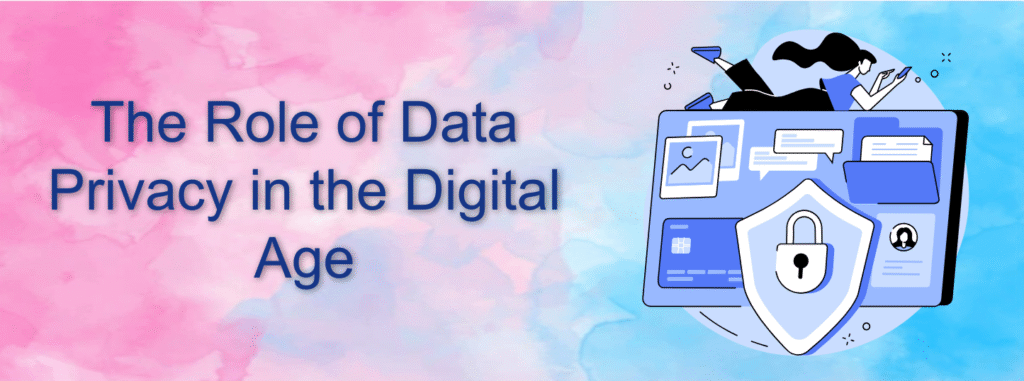The Role of Data Privacy in the Digital Age

Introduction: The Growing Importance of Data Privacy
In today’s interconnected world, data has become one of the most valuable commodities. Every action we take online—from browsing websites to making purchases—generates vast amounts of information. Whether personal, financial, or professional, this data is continuously collected, processed, and stored by various entities worldwide. Consequently, safeguarding personal data has never been more crucial.
This article explores why data protection matters in the digital age, the challenges surrounding it, and best practices to enhance data security.
Why Data Protection is Critical
1. Safeguarding Against Identity Theft and Fraud
With the rise of digital transactions, personal details such as credit card numbers, addresses, and social security numbers are increasingly vulnerable to theft. Cybercriminals exploit weak security measures to commit fraud and identity theft. Therefore, implementing robust privacy measures—such as encryption and secure authentication—is essential to reducing these risks.
2. Ensuring Regulatory Compliance
Many governments have established strict regulations to protect user privacy. Laws like the General Data Protection Regulation (GDPR) in the European Union and the California Consumer Privacy Act (CCPA) in the U.S. require businesses to handle consumer data responsibly. Non-compliance can lead to hefty fines and severe reputational damage, making it imperative for organizations to adopt stringent data protection measures.
3. Building Consumer Trust and Brand Reputation
In the digital age, consumers are more aware than ever of how their personal information is being used. Data breaches and privacy violations can significantly damage a company’s reputation, leading to lost customers and reduced trust. Conversely, businesses that prioritize strong data protection practices are more likely to build customer loyalty and long-term success.
Challenges in Data Protection
Despite the increasing focus on data security, several challenges make protecting personal information a complex task.
1. Rising Cybersecurity Threats
As more data is collected and stored, the risk of cyberattacks grows. Phishing, ransomware, and hacking attempts continue to evolve, targeting vulnerabilities in data storage systems. Therefore, businesses must constantly update their cybersecurity measures to stay ahead of cybercriminals.
2. Unchecked Data Proliferation
With the rapid expansion of the Internet of Things (IoT), more devices than ever before are generating data. From smart refrigerators to wearable fitness trackers, each device collects sensitive information that could be accessed or exploited. As a result, managing and securing this massive volume of data is a growing challenge for both individuals and businesses.
3. Lack of Awareness Among Users
Even with strong data security measures in place, a lack of awareness among users often leads to breaches. Weak passwords, failure to update software, and careless data sharing habits increase the risk of privacy violations. Thus, educating individuals on cybersecurity best practices is essential to reducing vulnerabilities.
Key Principles of Data Protection
To effectively safeguard personal information, organizations and individuals should adhere to the following key principles:
1. Data Minimization
Only collect the necessary amount of data required for a specific purpose. Limiting the storage of personal information reduces the risk of exposure in case of a breach.
2. Transparency and Consent
Users have the right to know what data is being collected and how it will be used. Businesses should provide clear privacy policies and obtain explicit consent before gathering personal data.
3. Strong Access Controls
Restricting access to sensitive information ensures that only authorized personnel can handle critical data. Using multi-factor authentication (MFA) and role-based access controls enhances security.
4. Encryption for Data Security
Encryption helps protect stored and transmitted data from unauthorized access. This technique is especially vital for online transactions, communications, and cloud storage.
5. Regular Security Audits and Updates
Since cyber threats are constantly evolving, privacy measures must be regularly updated. Conducting security audits, updating software, and revising privacy policies help maintain robust data protection.
Best Practices for Protecting Personal Information
Both individuals and businesses must take proactive steps to ensure the security of personal data.
- Use Strong Passwords and Multi-Factor Authentication (MFA): A strong, unique password is the first defense against cyber threats. Adding an extra layer of security through MFA significantly enhances protection.
- Keep Software and Systems Updated: Regularly updating software and applications ensures that known security vulnerabilities are patched. Enabling automatic updates simplifies this process.
- Be Cautious When Using Public Wi-Fi: Public networks are often unsecured and susceptible to cyberattacks. Using a Virtual Private Network (VPN) when accessing sensitive data can provide an added layer of security.
- Limit Sharing of Personal Information: Be mindful of the data you share on social media or other platforms. Providing excessive personal details increases the risk of privacy breaches.
- Review Privacy Settings Regularly: Most websites and apps allow users to customize privacy settings. Reviewing and adjusting these settings periodically helps control what information is shared and with whom.
Conclusion: The Future of Data Privacy
As we continue to rely more on digital platforms for communication, shopping, and work, protecting personal data must remain a top priority. By understanding the risks, challenges, and best practices associated with data privacy, individuals and businesses can secure their information in an increasingly digital world.
Prioritizing data security is not just about compliance—it’s about fostering trust, preventing cyber threats, and ensuring that we can enjoy the benefits of technology without compromising our safety. With proactive measures, we can create a future where data protection is at the core of our digital experiences.
USEFUL LINKS:
https://www.imperva.com/blog/why-data-security-and-privacy-in-the-digital-age-are-crucial/
https://www.integrate.io/blog/what-is-data-privacy-why-is-it-important/

